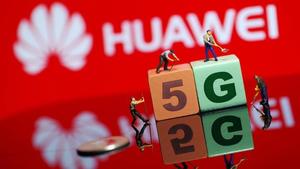 This undated photo shows logo of Huawei. (PHOTO / IC)
This undated photo shows logo of Huawei. (PHOTO / IC)
Huawei Technologies Co's fortunes in the United Kingdom took a U-turn when the British government decided to ban the world's largest telecom gear maker as a supplier for its 5G network.
Experts said the Huawei ban casts doubt on whether the UK remains an open, level playing field for Chinese companies, and the move would put the nation in a digital slow lane.
UK Secretary of State for Digital, Culture, Media and Sport Oliver Dowden said on Tuesday that British mobile operators will no longer be allowed to source 5G equipment from Huawei as of the end of 2020. Existing Huawei 5G hardware would also be removed from network infrastructure by 2027.
That marked an about-face from a decision in January, when Britain said Huawei equipment could be used in its new 5G network on a limited basis.
This is not about one company or one industry. It is about the UK at all costs highly politicizing business and technology issues.
Hua Chunying, Foreign Ministry spokeswoman, China
ALSO READ: Huawei ban wrong, harmful choice for Britain
Foreign Ministry spokeswoman Hua Chunying said on Wednesday that China will fully and seriously assess the UK's ban on Huawei, vowing to take all necessary measures to safeguard the legitimate rights and interests of Chinese enterprises.
"This is not about one company or one industry. It is about the UK at all costs highly politicizing business and technology issues," Hua said.
Liu Xiaoming, China's ambassador to the UK, described the Downing Street decision as "disappointing and wrong" in a post on Twitter.
"It has become questionable whether the UK can provide an open, fair and nondiscriminatory business environment for companies from other countries," Liu said.
The policy reversal came as the British government concluded that the United States' tightened semiconductor restrictions on Huawei would threaten to disrupt the company's supply chain.
But Huawei said in a statement that it "remains confident that the new US restrictions would not have affected the resilience or security of the products it supplies to the UK".
Zhang Jiangang, vice-president of Huawei, said earlier this month that the company will deliver about 500,000 5G base stations to the China market in 2020. What the UK might need from Huawei this year would be at most 20,000 5G base stations, and Huawei could supply that, despite the new US restrictions, Zhang said.
The decision on Tuesday did not, however, mention how to deal with Huawei's existing base stations in the UK's 2G, 3G and 4G networks. Currently, the Shenzhen-based company provides UK vendors with around one-third of their network equipment. Mobile operator BT has said it would need a five-year warning of a Huawei boycott in order to source enough equipment from elsewhere.
Xiang Ligang, director-general of the Information Consumption Alliance, a telecom industry advocacy group, called it a lose-lose decision. Huawei has been in the UK for two decades, and it has made a large investment in the nation.
Last month, Huawei received government approval to build a 1 billion pound ($1.26 billion) research facility in the UK. Officials said the facility has been envisaged as the international headquarters of the company's fiber optic communication business.
Ed Brewster, a spokesman for Huawei UK, said after Tuesday's decision, "Regrettably our future in the UK has become politicized. This is about US trade policy and not security.”
READ MORE: Huawei says UK ban threatens to move UK into digital slow lane
The UK government conceded that the Huawei ban will come with a huge economic loss. Dowden said the move would delay the rollout of 5G in Britain by two to three years at a cost of 2 billion pounds.
Chi Onwurah, shadow digital minister for the opposition Labour Party, said that the government's handling of Huawei had created a "car crash for the digital economy, but one that would have been visible from outer space".
In the first quarter of 2020, Huawei held its position as the world's largest telecom gear maker, with a market share of 35.7 percent, followed by Ericsson and Nokia, according to market research company Dell'Oro.
The ranking came despite Washington's intensified push to persuade its allies to ban Huawei.
Philippe de Backer, federal minister for telecom in Belgium, said on Tuesday that Huawei will not be banned from Belgium's 5G networks, according to reports from The Brussels Times.
Deutsche Telekom, Europe's largest telecom carrier, also said in a statement last week that it's committed to a multivendor strategy and that it buys from a large number of different manufacturers including Huawei.
Zhou Jin contributed to this story


